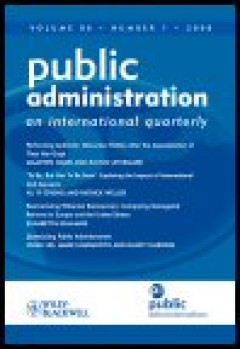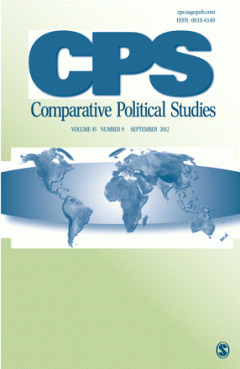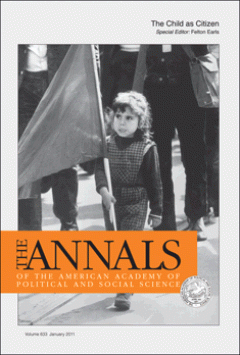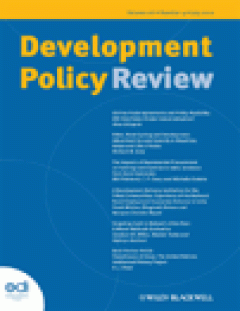Filter by

TWO MYTHS OF CONVERGENCE IN PUBLIC MANAGEMENT REFORM
The literature on public management reform exhibits two intertwined convergence myths. First, a world-wide consensus on a new public management (NPM) reform agenda is seen to exist amongst policy reformers and practitioners. If this agenda is not fully implemented in all cases, this is generally explained by political and reform setbacks rather than disagreement on policy aims. Second, this NPM…
- Edition
- Volume 88, Issue 4, pages 1099–1115, December 2010
- ISBN/ISSN
- 00333298
- Collation
- -
- Series Title
- Public Administration
- Call Number
- -

NEW PUBLIC MANAGEMENT FOR THE ‘CLASSICAL CONTINENTAL EUROPEAN ADMINISTRATIO…
The article is aimed at analysing New Public Management (NPM) reforms at the local level in Germany, France and Italy. The case selection is justified by the fact that these three �classical� Continental European countries have largely been missing from comparative administrative research thus far. The article focuses on local governments, since in all three countries these are considered the N…
- Edition
- Volume 88, Issue 4, pages 1116–1130, December 2010
- ISBN/ISSN
- 00333298
- Collation
- -
- Series Title
- Public Administration
- Call Number
- -

Do Migrants Improve Their Hometowns? Remittances and Access to Public Service…
How do citizens in developing countries access public services? Scholars study this question by emphasizing the role of government, measuring government performance as household access to public services, such as clean water and sanitation. However, the authors argue that the state does not hold a monopoly on provision of such utilities: Citizens in developing countries often turn to nonstate p…
- Edition
- Vol. 44 no. 1. January 2011.pp. 3-27
- ISBN/ISSN
- 00104140
- Collation
- -
- Series Title
- Comparative Political Studies
- Call Number
- -

The Nature, Determinants, and Consequences of Chávez’s Charisma: Evidence …
Venezuelan President Hugo Ch�vez is frequently labeled �charismatic,� but this aspect of his leadership has mostly escaped direct argument and analysis. The authors offer a measure of charisma and a reciprocal account of the relationship between charisma and performance evaluations. Data from a national survey of Venezuelans confirm that perceptions of Ch�vez�s charisma in 2007 were comparative…
- Edition
- Vol. 44 no. 1, January 2011.pp. 28-54
- ISBN/ISSN
- 00104140
- Collation
- -
- Series Title
- Comparative Political Studies
- Call Number
- -

The Role of Executive Time Horizons in State Response to AIDS in Africa
In this article the author argues that politicians� time horizons affect the differing levels of state intervention against AIDS. Using data measuring government spending, AIDS policy, and political constraints, the author tests the presumption that the leader of a country can determine a country�s level of AIDS intervention. She looks at countries in eastern and southern Africa to explore the …
- Edition
- Vol. 44 no. 1, January 2011.pp. 55-77
- ISBN/ISSN
- 00104140
- Collation
- -
- Series Title
- Comparative Political Studies
- Call Number
- -

Children: From Rights to Citizenship
This article introduces the themes of children�s rights and citizenship and surveys the authors� contributions to this volume of The Annals. The volume marks the 20th anniversary of the United Nations General Assembly�s adoption of the Convention on the Rights of the Child (CRC). As the most widely ratified of all human rights covenants, adoption of the CRC represents a landmark achievement in …
- Edition
- Vol. 633 no. 1, January 2011.pp. 6-16
- ISBN/ISSN
- 00027162
- Collation
- -
- Series Title
- The ANNALS of the American Academy of Political and Social Science
- Call Number
- -

A Historical Context for the United Nations Convention on the Rights of the C…
The United Nations (UN) Convention on the Rights of the Child (CRC) was a by-product of international commitments to human rights, but its history lies in the complex and contradictory developments of the twentieth century, when elevated expectations regarding the welfare of children confronted the realities of war. In the late nineteenth century, material conditions and reform efforts redefine…
- Edition
- Vol. 633 no. 1, January 2011.pp. 17-29
- ISBN/ISSN
- 00027162
- Collation
- -
- Series Title
- The ANNALS of the American Academy of Political and Social Science
- Call Number
- -

Multigenerational Citizenship: The Importance of Recognizing Children as Nati…
This article discusses the author�s concept of multigenerational citizenship, arguing that for citizenship to be relevant for children, there needs to be a more flexible and relational approach to citizenship. Tom Paine�s theories are expanded upon, by examining the increasing acceptance, by both international and regional fora in both political and human rights, of a child�s autonomy in bringi…
- Edition
- Vol. 633 no. 1. January 2011.pp. 30-51
- ISBN/ISSN
- 00027162
- Collation
- -
- Series Title
- The ANNALS of the American Academy of Political and Social Science
- Call Number
- -

Public Policies and Child Rights: Entering the Third Decade of the Convention…
After 20 years of implementation of the Convention on the Rights of the Child (CRC), it is increasingly clear that states bear the responsibility to promote, guarantee, respect, and fulfill the realization of children�s rights by all members of the national and international communities. An initial emphasis on legal reforms to adapt national law to the CRC�absolutely necessary but not sufficien…
- Edition
- Vol. 633 no. 1. January 2011.pp. 52-65
- ISBN/ISSN
- 00027162
- Collation
- -
- Series Title
- The ANNALS of the American Academy of Political and Social Science
- Call Number
- -

The Promise of Citizenship for Brazilian Children: What Has Changed?
This article explores the ideas behind the promise of citizenship to children in Brazil. The human rights of children has become a very important issue in Brazil. This has been especially true since the inclusion of Article 227 in the 1988 Constitution referring to children�s rights and the approval of the Statute on the Child and the Adolescent in 1990, less than a year after the ratification …
- Edition
- Vol. 633 no. 1. January 2011.pp. 66-79
- ISBN/ISSN
- 00027162
- Collation
- -
- Series Title
- The ANNALS of the American Academy of Political and Social Science
- Call Number
- -

Ratification by the United States of the Convention on the Rights of the Chil…
This article discusses the significance of the United States� ratification of the CRC, concluding that even if the treaty is not self-executing, ratification would make a major difference. It would enable the United States to better promote children�s rights abroad, and it would push the United States to develop its domestic law in dramatically new directions that empower children. The CRC prov…
- Edition
- Vol. 633 no. 1. December 2011. pp. 80-101
- ISBN/ISSN
- 00027162
- Collation
- -
- Series Title
- The ANNALS of the American Academy of Political and Social Science
- Call Number
- -

Children and the Rights of Citizens: Nondomination and Intergenerational Justice
The Convention on the Rights of the Child (CRC) emphasizes the importance of the temporal dimension of childhood and children�s need for special protection. Such protection is necessary because of their susceptibility to domination, especially intergenerational domination. The same is true for past and future generations, where such domination includes the domination of and by the current gener…
- Edition
- Vol. 633 no. 1. January 2011.pp. 128-140
- ISBN/ISSN
- 00027162
- Collation
- -
- Series Title
- The ANNALS of the American Academy of Political and Social Science
- Call Number
- -

The Child as Democratic Citizen
The United Nations Convention on the Rights of the Child (CRC) justifiably emphasizes welfare over participation rights of children for two reasons. First, children are by nature an at-risk population. Second, democratic citizenship rights require a minimal bundle of cognitive and emotional capacity�which may be called �political maturity��that children, again by nature, lack. However, the CRC …
- Edition
- Vol. 633 no. 1. January 2011.pp. 141-166
- ISBN/ISSN
- 00027162
- Collation
- -
- Series Title
- The ANNALS of the American Academy of Political and Social Science
- Call Number
- -

To Be (Come) or Not to Be (Come): Understanding Children’s Citizenship
This article explores notions of the �child as citizen� and �children�s citizenship� in the context of possibilities and promises for the rights of children that are laid out in the United Nations Convention on the Rights of the Child. It poses the question, Can �children�s citizenship� ever be fully accomplished for and/or by children? The article begins with an examination of contemporary the…
- Edition
- Vol. 633 no. 1. January 2011.pp. 167-179
- ISBN/ISSN
- 00027162
- Collation
- -
- Series Title
- The ANNALS of the American Academy of Political and Social Science
- Call Number
- -

Participatory Niches for Emergent Citizenship in Early Adolescence: An Intern…
This article is based on the assumption that the right to vote in national elections is not an essential dimension of citizenship for early adolescents as long as adolescents� other competencies and attitudes are nurtured in their everyday settings. The article addresses the issue of children or early adolescents and their political and civic participation from three perspectives. First, it exa…
- Edition
- Vol. 633 no. 1, January 2011.pp. 180-200
- ISBN/ISSN
- 00027162
- Collation
- -
- Series Title
- The ANNALS of the American Academy of Political and Social Science
- Call Number
- -

American Sixteen- and Seventeen-Year-Olds Are Ready to Vote
American 16- and 17-year-olds ought to be allowed to vote in state and national elections. This claim rests upon a line of argument that begins with an exegesis of legal and philosophical notions of citizenship that identify core qualities of citizenship: membership, concern for rights, and participation in society. Each of these qualities is present in rudimentary form in childhood and adolesc…
- Edition
- Vol. 633 no. 1.January 2011.pp. 201-222
- ISBN/ISSN
- 00027162
- Collation
- -
- Series Title
- he ANNALS of the American Academy of Political and Social Science
- Call Number
- -

Adolescents as Deliberative Citizens: Building Health Competence in Local Com…
Given the host of tragic events that children experience, it is often compelling for well-intended adults to respond in a protective and charitable fashion. The child rights approach asks for more. Building on their collective experiences in the developmental and social sciences, the authors present in roughly chronological fashion a synopsis of the theoretical explorations and scientific evalu…
- Edition
- Vol. 633 no. 1. January 2011. pp. 223-242
- ISBN/ISSN
- 00027162
- Collation
- -
- Series Title
- The ANNALS of the American Academy of Political and Social Science
- Call Number
- -

Promoting Children’s Capacities for Active and Deliberative Citizenship wit…
This article explains several core aspects of the experience of the Omar Dengo Foundation of Costa Rica in the development of the Deliberative Capabilities in School Age Children project, a set of citizenship education programs based on the conception of children as citizens and on a particular conception of the role of digital technologies in the promotion of children�s high-order skills. It a…
- Edition
- Vol. 633 no. 1. January 2011.pp. 243-262
- ISBN/ISSN
- 00027162
- Collation
- -
- Series Title
- The ANNALS of the American Academy of Political and Social Science
- Call Number
- -

Creating a Capable Bureaucracy With Loyalists: The Internal Dynamics of the S…
This study explores why South Korea�s top leadership combined a merit-based principle with region-based particularistic elements in the recruitment and promotion of career bureaucrats of the Ministry of Commerce and Industry (MCI) during its industrial takeoff in the 1960s and 1970s. It also investigates how this recruitment and promotion style was emulated by business sectors as a way of secur…
- Edition
- Volol. 44 no. 1. January 2011.pp. 78-108
- ISBN/ISSN
- 00104140
- Collation
- -
- Series Title
- Comparative Political Studies
- Call Number
- -

The Political Role of Service Delivery in State-Building: Exploring the Relev…
Concerns about failed and fragile states have put state- and nation-building firmly on the academic and policy agenda, but the crucial role of public services in this process has remained underexplored. The 1960s and �70s generated a substantial set of literature that is largely missing from current writing. It identified state penetration, standardisation and accommodation as key processes in …
- Edition
- Volume 29, Issue 1, January 2011. pages 5–21
- ISBN/ISSN
- 14675986
- Collation
- -
- Series Title
- Development Policy Review
- Call Number
- -
 Computer Science, Information & General Works
Computer Science, Information & General Works  Philosophy & Psychology
Philosophy & Psychology  Religion
Religion  Social Sciences
Social Sciences  Language
Language  Pure Science
Pure Science  Applied Sciences
Applied Sciences  Art & Recreation
Art & Recreation  Literature
Literature  History & Geography
History & Geography